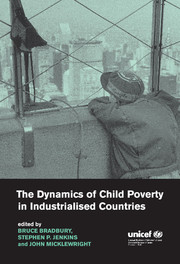Book contents
- Frontmatter
- Contents
- List of figures
- List of tables
- Notes on the contributors
- Acknowledgements
- 1 Beyond the snapshot: a dynamic view of child poverty
- Part I Issues and cross-national evidence
- Part II Topics in child poverty dynamics
- 5 Income mobility and exits from poverty of American children
- 6 Child poverty in Germany: trends and persistence
- 7 Poverty among British children: chronic or transitory?
- 8 Child income poverty and deprivation dynamics in Ireland
- 9 Young people leaving home: the impact on poverty in Spain
- 10 Are children being left behind in the transition in Hungary?
- 11 Mobility and poverty dynamics among Russian children
- Summary and policy conclusions
- Index of authors
- Index by subject
8 - Child income poverty and deprivation dynamics in Ireland
Published online by Cambridge University Press: 02 December 2009
- Frontmatter
- Contents
- List of figures
- List of tables
- Notes on the contributors
- Acknowledgements
- 1 Beyond the snapshot: a dynamic view of child poverty
- Part I Issues and cross-national evidence
- Part II Topics in child poverty dynamics
- 5 Income mobility and exits from poverty of American children
- 6 Child poverty in Germany: trends and persistence
- 7 Poverty among British children: chronic or transitory?
- 8 Child income poverty and deprivation dynamics in Ireland
- 9 Young people leaving home: the impact on poverty in Spain
- 10 Are children being left behind in the transition in Hungary?
- 11 Mobility and poverty dynamics among Russian children
- Summary and policy conclusions
- Index of authors
- Index by subject
Summary
Poverty, deprivation and the Irish context
Research on poverty and on poverty dynamics generally focuses on income. Thus in part I of this book, the dynamics of child poverty have been measured in terms of the extent to which households with children move above or below income poverty lines over time. Such a focus involves measuring the income of a set of households with children at various points in time, using different waves of a longitudinal household survey, and looking at the extent to which they move across income poverty lines from one wave to another. This provides a basis for not only assessing how much movement there is into and out of poverty, but also for identifying the characteristics of those affected and what triggers poverty entries or escapes.
This chapter aims to show how that picture of income poverty dynamics can be usefully complemented by analysis of information on an extensive set of non-monetary indicators of lifestyle or deprivation. It uses two waves of an Irish panel survey to examine how deprivation changed from one year to the next for households with children. This allows us to examine the extent of stability versus change in deprivation levels, compared with the income poverty transitions for the same set of Irish households as described as part of the comparative analysis of income dynamics presented in chapter 4. This exercise helps in assessing and understanding the implications of income poverty dynamics for living standards.
- Type
- Chapter
- Information
- The Dynamics of Child Poverty in Industrialised Countries , pp. 196 - 214Publisher: Cambridge University PressPrint publication year: 2001
- 3
- Cited by



